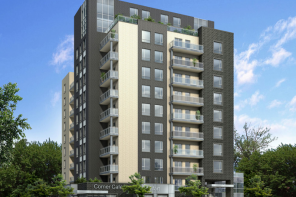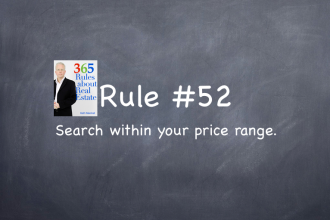 When it comes to buying a house there are several ways of thinking about how much house you can afford. Some will say you should only buy a home that is below a certain percentage of your gross income. Others will say that you shouldn’t buy a home that is more than a percentage of your annual income. Still others will tell you that you should rent and do your best to save up for a home and only buy when you can pay with cash. Conversely, on the other end of the spectrum there are those that say it’s OK to buy a home above your means because you’ll grow into the payments as your income increases.
When it comes to buying a house there are several ways of thinking about how much house you can afford. Some will say you should only buy a home that is below a certain percentage of your gross income. Others will say that you shouldn’t buy a home that is more than a percentage of your annual income. Still others will tell you that you should rent and do your best to save up for a home and only buy when you can pay with cash. Conversely, on the other end of the spectrum there are those that say it’s OK to buy a home above your means because you’ll grow into the payments as your income increases.
There is no shortage of advice when it comes to figuring out how much house you can afford. The best place to start is with your lender. Bankers and other mortgage professionals do this for a living so I think its safe to say that their opinion is expert opinion. But before you do that, there are some exercises you can think about to help you figure out just how much house you can afford.
First of all, consider the secondary factors:
There is no magic dollar amount for the “perfect home.” How much house you can afford is as unique as you are and is based on many factors—your location, income, savings, personal preferences, and most importantly, the house-buying plan you have in place.
The ideal way to buy a home is the 100%-down plan. No mortgage! No payments! But who can do that?
Since you can’t postpone the purchase until you can pay cash, buy a home with a down payment of at least 10% on a 15-year (or less) fixed-rate mortgage. Limit your monthly payment to 25% or less of your monthly take-home pay.
You should put down as much as you can on your home purchase. A shorter term mortgage will decrease your mortgage amount substantially
Secondly, consider your income
Most people can afford a house anywhere from 29-41% of their gross income, depending on whether they have other debt.
When it comes to buying a home, the bottom line isn’t how much houses cost. It’s how much you can afford to spend. Most people can afford to spend 29% of their gross income on housing costs, including the mortgage payment and property taxes, and as sometimes as much as 41%, so long as they have no debt. You should also consider your other savings goals, medical expenses, ongoing household repairs and maintenance, and even how secure your job is. Once you calculate your magic number, play it safe by knocking off an additional 10-20%. It’s a good idea to keep your purchase on the lower end of what you can afford
Third – A good rule of thumb
Never purchase a house that requires a mortgage that is more than twice your household’s total annual realized income.
So Stanley suggests that you should never have a mortgage that is more than twice your annual net income. So if you have an income of $100,000/year, you shouldn’t be getting into a mortgage that is any more than $200,000. That means that if you have a down payment of $40,000, you could afford a $240,000 house.
Fourth – Current rent plus 45%
Figure out what you’re currently paying for rent, add 45% to it to account for taxes, insurance and other home ownership costs, and then start paying your rent and then saving the extra 45% for a few months along with all of your other regular bills and saving. If you can do it without too much problem you could then consider home ownership. If not, avoid buying until a time when you can make those payments easily.
What Banks Say You Can Afford
Banks have their own way of figuring out how much house you can afford – or how much they’re willing to risk by lending to you. Usually it involves figuring our what your debt to income ratio is.
- Front end DTI of 28%: When figuring out how much of a loan to approve you for, banks will figure out what your front end debt to income ratio is. In general they’ll want you to be at a DTI of 28% or less. To figure out what yours would be you take the potential cost of your monthly mortgage payments, taxes and insurance and divide it by your monthly income.
- Back end DTI of 36%: Banks will also want your back end DTI to be less than 36%. Back end DTI is like front end, except that it also includes any other monthly debt obligations beyond your mortgage – things like credit cards, student loans… To figure out what yours would be you take the potential cost of your monthly mortgage payments, taxes and insurance, and then the rest of your debt obligations and divide it by your monthly income.
So banks are usually willing to lend people money that will give them a debt to income ratio of anywhere from 28-36%, depending on whether all debts are factored in.
The Costs Of Home Ownership
Home ownership costs don’t begin and end with the mortgage payment. There are a host of other costs you’ll need to take into account when buying your new house, and figuring out how much you can afford. Here are just a few:
- Property taxes: property taxes can be a huge yearly cost, depending on how much your home is worth, and where you live. In Kitchener Waterloo the average property tax is likely around $3500/year (and increasing).
- Insurance: Homeowner’s insurance is another cost you’ll need to take into account.
- Mortgage insurance: If you weren’t able to put down 20% on your new home, you may be required to pay CMHC insurance. That can be $100-200 or more per month added to your payment.
- Association costs: If your new home is an association run neighborhood, you can expect monthly dues payments.
- Outdoor maintenance: If you hire a service to take care of your lawn, pool or snow removal, this will add to your costs.
- Utilities: The bigger the house, the more you’ll usually have to pay for the utilities. Bigger houses cost more to heat and cool!
- Maintenance: If it’s an older house it may require more regular maintenance, something to take into account.
- Distance from work: If the home is further from your work, your commuting costs may be higher.
Ultimately, I think its best to buy less house than you can afford. You don’t want to be “house poor” and you want to retain some level of flexibility in case your life change is some unforeseen way (change jobs, get married, get divorced, have twins…), you never know. You should not think about your house as an income generating, wealth creating vehicle. You should think of it as your own home.




